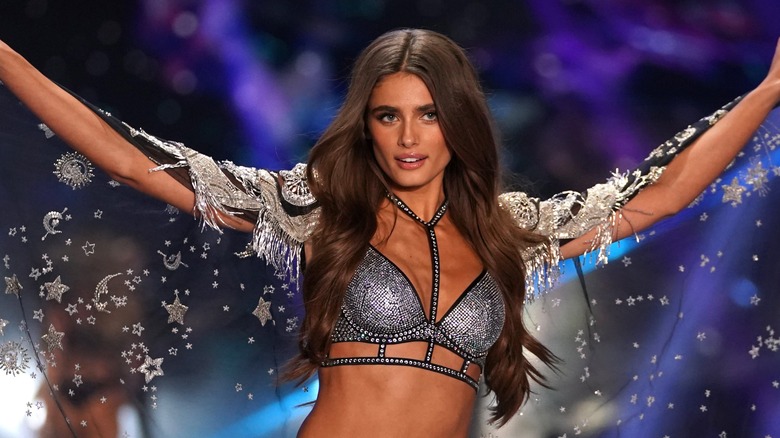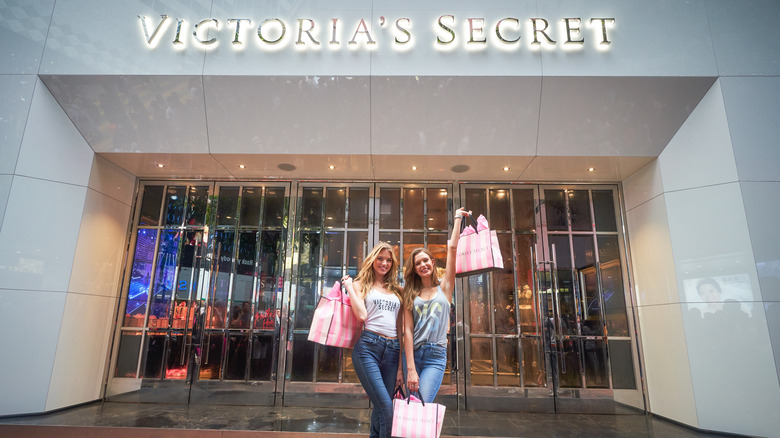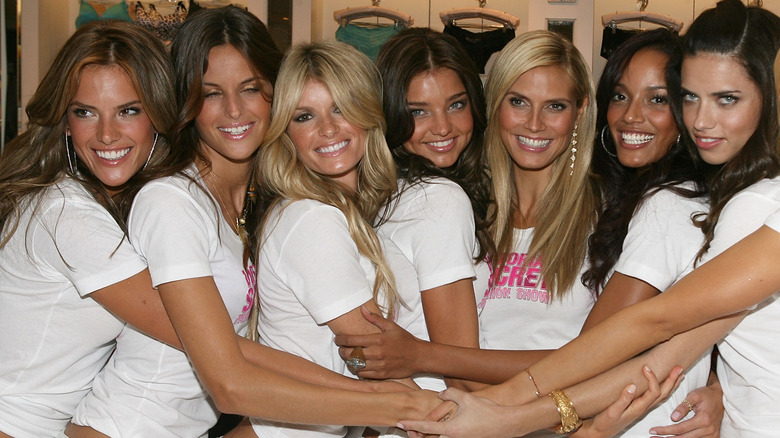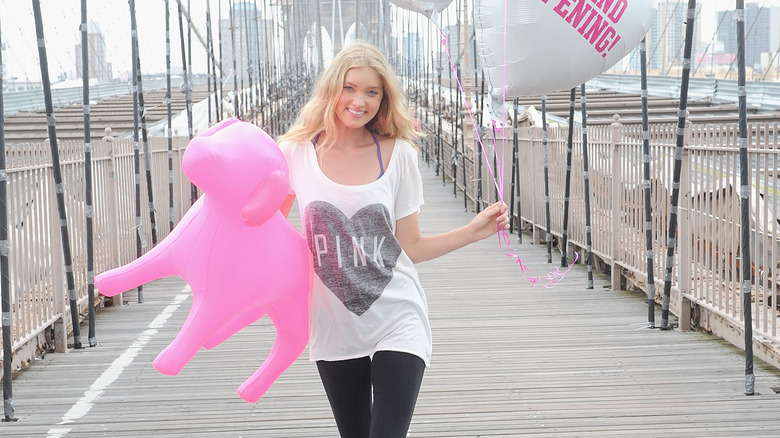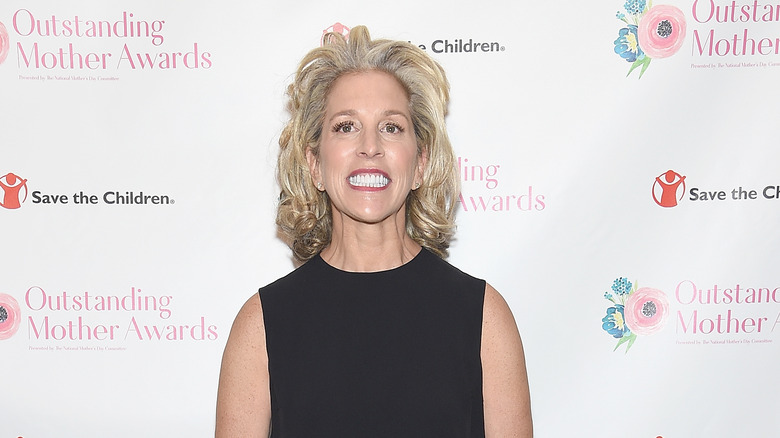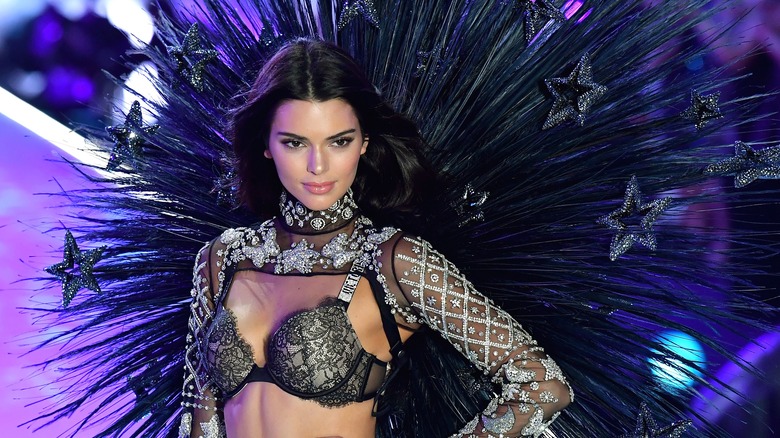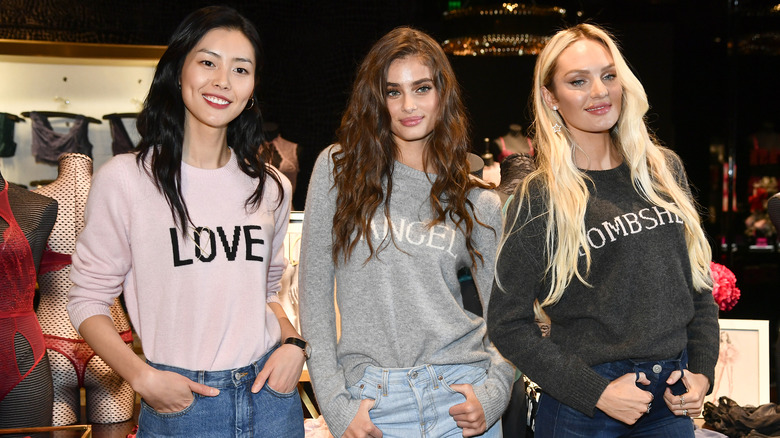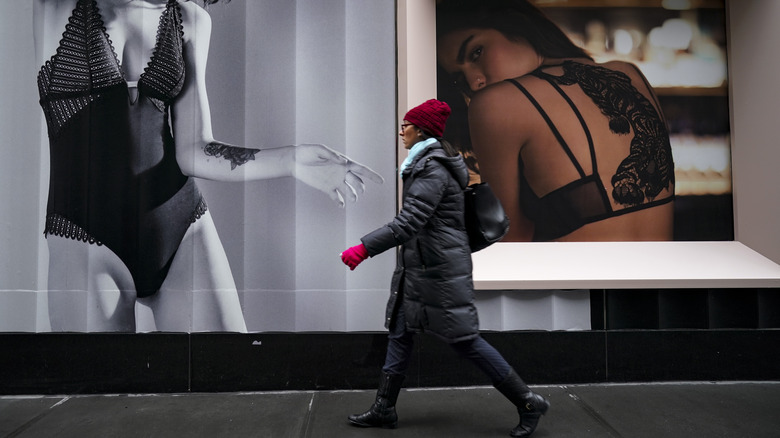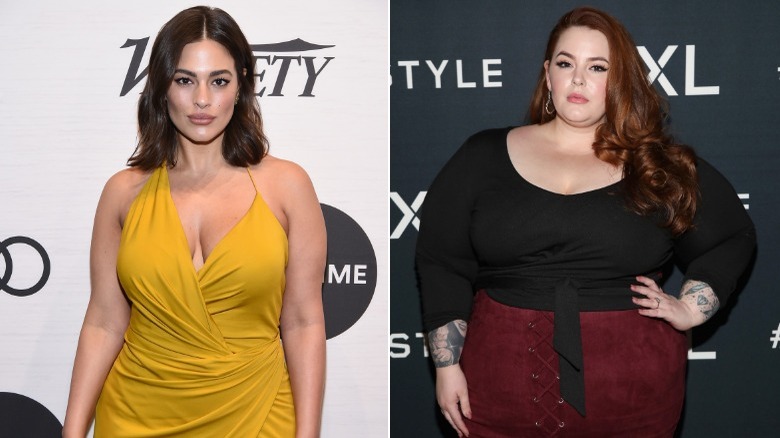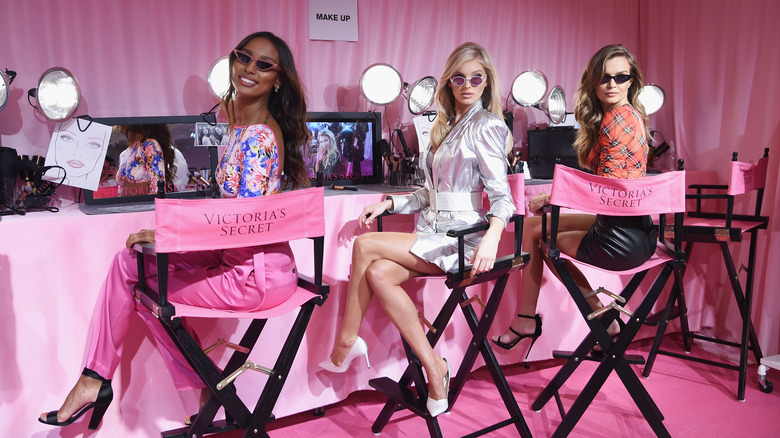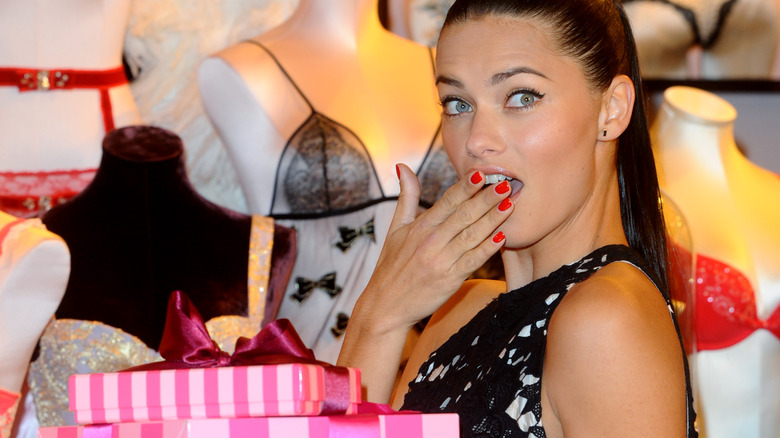The Real Reason Victoria's Secret Is Closing So Many Stores
Victoria's Secret was founded in 1977 by a man by the name of Roy Raymond, who found himself annoyed at visiting department stores to purchase lingerie for his wife only to be met with matronly, floral-print nightgowns and harsh fluorescent lighting. After discovering many of his male friends felt the same way about shopping for their partners' intimates, Raymond decided to open a "Victorian-boudoir" themed lingerie store in a small Palo Alto, California shopping mall, according to Slate. Raymond called his creation — you guessed it — Victoria's Secret.
Since then, the Victoria's Secret brand has become a worldwide success. The company has enjoyed decades of being a top lingerie retailer in North America, and has expanded its brand to include a yearly primetime fashion show, bath and body products, and a mega-popular swimwear line. However, in 2018, Victoria's Secret's parent company, L Brands, announced the closure of 30 stores across the country — and, in 2019, that number jumped to 53. Has the world-famous lingerie brand lost its mojo? Here's why Victoria's Secret stores are disappearing all over the country.
A decline in performance
In April 2019, it was announced that Victoria's Secret would be closing 53 stores across North America throughout the year. For those not following the company's controversies, leadership shake-ups, and fiscal reports for the past few years, the news likely came as a shock. After all, the lingerie brand has been the number one of its kind for years. However, as Business Insider reported, the planned store closings were the result of the company's steady "decline in performance" across the board.
The 2019 announcement came on the heels of a similar 2018 announcement in which the company revealed plans to shutter 30 Victoria's Secret stores across the country. This was a sky-high jump from previous store closings, which usually averaged around 15 stores per year (via USA Today). According to Stuart Burgdoerfer, L Brand's executive vice president and chief financial officer, the decision to close the increased number of stores was "based on the overall performance of the Victoria's Secret business not meeting our expectations or having year-on-year declines."
An exec made some pretty controversial comments
In November 2018, the chief marketing officer of L Brands (the retailer that owns both Victoria's Secret and Bath & Body Works), Ed Razek, made a splash in the headlines for controversial comments he delivered during an interview with Vogue. Along with Monica Mitro, the vice president of public relations at Victoria's Secret, Razek found himself faced with difficult questions from the publication regarding the ever-evolving market of womenswear and why Victoria's Secret has largely remained stagnant in the type of women they choose to both market to and represent.
While explaining why the lingerie retailer doesn't feature larger women or transgender women in their famous, yearly fashion show, Razek shot down the idea and wasted no time throwing shade at ThirdLove — an online womenswear retailer offering an array of sizes for most every body type. "[Competitors] carp at us because we're the leader," Razek told Vogue. "But we're nobody's third love. We're their first love. And Victoria's Secret has been women's first love from the beginning."
Body positivity is on trend
During his controversial 2018 interview with Vogue, Ed Razek justified Victoria's Secret's lack of plus-size models by citing that they "attempted to do a television special" in 2000 specifically for plus sizes. The chief marketing officer told the publication, "No one had any interest in it, [and they] still don't."
Razek's comments did nothing but further prove a growing suspicion that the world-famous lingerie brand is more out of touch than ever before. His claim of consumers having no interest in seeing plus-size bodies represented is simply untrue, as evidenced by the success plus-size womenswear retailer Lane Bryant saw after relaunching its mega-popular #ImNoAngel campaign in 2017. Featuring plus-size models of different shapes and sizes urging women to own their cellulite, tummy flab, and stretch marks, Lane Bryant's ad aired during the 2017 primetime Emmy Awards — a choice that Lane Bryant's CMO, Brian Beitler, said was incredibly intentional.
"We felt that it was an incredible opportunity to dare all women to embrace what makes her feel most confident and remind the world that the old stereotypes of beauty are dead," Beitler revealed to Refinery29.
The sorority of stores?
It seems that pink just isn't Victoria's Secret's color — which is unfortunate, considering the amount of time, energy, and money the company has invested in trying to make a success out of their collegiate-themed apparel line, Pink.
In 2016, Business Insider called Pink, which is made for and marketed to the brand's younger consumer base, "the future of Victoria's Secret." The publication even went so far as to say that Pink "stands on its own as a viable business." However, business analysts revealed in 2018 (via Slate) that Pink sales were steadily declining — much like the rest of Victoria's Secret.
An opinion piece written for Bloomberg by Sarah Halzack in August 2018 revealed that sales for Pink had declined by "mid-single digits" from the previous year. According to Halzack, these increasingly disappointing numbers for a brand once thought to be the "future" of Victoria's Secret are a sign of rocky roads ahead. "Performance like this makes it awfully hard to believe in the lofty ambitions the company has for this brand," Halzack wrote.
Another one bites the dust
In November 2018 — only days after Ed Razek's controversial Vogue interview hit the stands — it was announced that Jan Singer, the chief executive officer of L Brands, had left her role after only two years with the company.
According to Women's Wear Daily, Singer (the former head of Spanx) had been hired to "help revive" the lingerie company, whose sales had been declining. During her time with Victoria's Secret, Singer placed focus on producing bras that "balanced functionality with fashion," presumably to be able to compete with emerging, popular brands such as ThirdLove and Aerie. Despite her attempts at remodeling the brand's strategy, both in-store and online Victoria's Secret sales continued to decline as consumers gravitated toward brands for which size inclusivity and representation were top priorities. When Singer's departure from the brand was announced in November 2018, Bloomberg reported that the company's stock price was down about 39 percent.
The fashion show is a little cringy
When asked about the Victoria's Secret fashion show's lack of body diversity in his much-talked-about Vogue interview, chief marketing officer Ed Razek replied, "It's like, why doesn't your show do this? Shouldn't you have transsexuals in the show? No. No, I don't think we should," adding, "Because the show is a fantasy. It's a 42-minute entertainment special. That's what it is. It is the only one of its kind in the world."
Razek is certainly right about the show being a "fantasy," as the costumes and the bodies of the models who sport them are both unrealistic and largely unattainable to the average American woman. Models strut down the Victoria's Secret runway, beaming as they wear a pair of larger-than-life "angel wings," and much of the televised program is dedicated to showing the various models' excitement over achieving their biggest dream: becoming a Victoria's Secret angel. The fashion show seems to be more focused on empowering the models who walk in it instead of trying to reach and/or relate to consumers — and that's probably why the ratings for the yearly program continue to fall.
Comfort over sex appeal
During its heyday, Victoria's Secret was famous for its sultry selection of bras, underwear, and lingerie sets. While many of its pieces were decidedly not appropriate for everyday wear, the brand solidified itself as the go-to place to purchase special date-night surprises, sexy loungewear, and Christmas gifts you probably wouldn't want to open in front of the whole family.
However, nothing stays the same forever. While feeling bold and sexy might have been a priority for consumers of the mid-to-late 2000s, comfort and ease-of-wear have since taken over the number one spot of what women are looking for when shopping for undergarments. Forbes writer Pamela N. Danzinger cleverly asserted in a 2018 article, "Comfort, not sex appeal, is the secret today and Victoria's Secret doesn't fit. The bras are designed for men to look at, not women to wear." Danzinger backed up her claim by citing a blog post from a former professional bra fitter named Courtney who used Victoria's Secret advertisements to detail just how ill-fitting their bras really are. Courtney even went on to reveal that Victoria's Secret bra fitters reportedly aren't certified, leading to inaccurate measurements and uncomfortable wear for consumers.
Women think the brand feels forced
After Ed Razek's November 2018 Vogue interview and Jan Singer's unexpected departure from the brand, multiple news outlets delved into investigating just how the once-beloved, mega-popular womenswear brand had garnered such a bad reputation and rapidly declining sales. The New York Times noted that, while Victoria's Secret is still the leading U.S. lingerie brand, a September 2017 consumer study found that 68 percent of consumers like the brand "less than they used to," and a whopping 60 percent of consumers think that Victoria's Secret feels "forced" or "fake."
Heidi Zak, chief executive officer of ThirdLove, told the NYT that she often felt embarrassed after shopping at Victoria's Secret and "used to dread" having to shop in the store.
"I came out and I took the pink striped bag and stuffed it in my bag because I was embarrassed I'd been shopping there," Zak revealed to the publication. "Nothing about the brand — the aesthetic, the product — nothing really resonated with me."
Stars are speaking out
Major celebrities have seemingly had enough with the famous lingerie brand — and, in the age of social media and instant gratification, they're better able to start a ripple effect among their followers by voicing their opinions and bringing to light their own issues with the retailer.
In November 2017 — the day before the Victoria's Secret fashion show was set to film – plus-size model, Sports Illustrated covergirl, and body positive activist Ashley Graham took to Instagram to post a lingerie-clad photo of herself strutting down a runway, complete with a photoshopped pair of angel wings. Graham added a winking emoji to the caption, writing, "Got my wings!" Without taking an outright jab at Victoria's Secret, the plus-size supermodel proved that any body type is worthy of angel-status — not just the unattainable airbrushed bodies of Victoria's Secret models.
In 2018, plus-size model Tess Holliday left some choice words on Twitter for Ed Razek following his Vogue interview. "Who needs VS anyway?" the model wrote. "They never supported plus ladies & now they are trying to dis my trans sisters? Hell nah. Kiss my fat ass, [Victoria's Secret]."
Mean girls?
A December 2018 think-piece written by Amanda Mull for The Atlantic asserted that Victoria's Secret is the "mean girl" of womenswear retailers. Mull claimed the lingerie retailer has not only refused to change its business model — it has refused to change its you-can't-sit-with-us tone that helped solidify the brand as the cool, sexy store from which every woman (and many men) wanted to buy. In the article, Mull noted that many companies have adjusted their brands' "voices" as the social media machine continues to change how consumers shop. Specifically, a majority of brands now "clamor to be women's friends." Hull noted, "They post memes on Instagram, they expand their size ranges ever so slightly, [and] they associate themselves with a more comfortable, livable idea of beauty."
Victoria's Secret, however, has made little-to-zero effort in making themselves seem more accessible to "normal" women. In fact, as Mull pointed out, the voice used in the brand's ultra-sultry advertisements has always been British — even though the company is based in Ohio. Victoria's Secret refuses to market itself as a store for the everyday woman, and, according to Mull, the brand is "among the last of the mean girls."
No self-awareness
It seems pretty obvious to the retail and consumer world at large that Victoria's Secret is on a path to self-destruction. Even without controversial interviews, executives leaving the company, and high-profile celebrities speaking out against the lingerie brand's refusal to implement inclusivity and representation of all body types — the numbers show that consumers are simply not as infatuated with the retailer as they once were. Of course, there's always a chance Victoria's Secret could redeem itself by listening to consumers and taking note from the successes of their competitors — but, as we know, the first step to any kind of recovery is admitting there's a problem. And unfortunately, it doesn't seem like the brand will be owning up to their misgivings anytime soon.
A December 2018 InStyle article highlighted the fact that Victoria's Secret replaced CEO Jan Singer with John Mehas, proving that the company (which was founded and still largely run by men) "actually has no interest in breaking from the male gaze." If Victoria's Secret continues to make decisions uninformed by their consumer base — the majority of which is female — the company will almost certainly soon be their own undoing.
